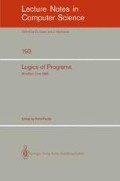Abstract
The propositional mu-calculus is a propositional logic of programs which incorporates a least fixpoint operator and subsumes the Propositional Dynamic Logic of Fischer and Ladner, the infinite looping constructs of Streett and Sherman, and the Game Logic of Parikh. The propositional mu-calculus is strictly stronger in expressive power than any of these other logics. However, the mu-calculus satisfiability problem is polynomially reducible to the satisfiability problem for Propositional Dynamic Logic with Streett's looping construct. This result shows the connection between fixpoints and program looping, provides an alternative decision procedure for the mu-calculus, and rules out the possibility that the complexities of the two logics could be separated by new upper and lower bound results. We also give reductions from several weaker mu-calculi (including those investigated by Kozen, Vardi and Wolper) into variants of Propositional Dynamic Logic with weaker looping constructs (including Sherman's looping construct). The deterministic exponential time upper bounds obtained for these mu-calculi may also be obtained via these reductions.
Preview
Unable to display preview. Download preview PDF.
References
de Bakker, J., and de Roever, W. P. (1973), A Calculus for Recursive Program Schemes, First International Colloquium on Automata, Languages, and Programming, 167–196.
de Roever, W. P. (1974), Recursive Program Schemes: Semantics and Proof Theory, Ph.D. thesis, Free University, Amsterdam.
Ehrenfeucht, A., and Zeiger, P. (1976), Complexity Measures for Regular Expressions, Journal of Computer System Science12, 134–146.
Emerson, A. E., and Clarke, E. C. (1980), Characterizing Correctness Properties of Parallel Programs using Fixpoints, Seventh International Colloquium on Automata, Languages and Programming, 169–181.
Fischer, M. J., and Ladner, R. E. (1979), Propositional Dynamic Logic of Regular Programs, Journal of Computer System Science18, 194–211.
Harel, D. (1979), First Order Dynamic Logic, Springer-Verlag Lecture Notes in Computer Science68.
Harel, D., and Sherman, R. (1984), Looping versus Repeating in Dynamic Logic, Information and Control55, 175–192, 1984.
Hitchcock, P., and Park, D. M. R. (1973), Induction Rules and Termination Proofs, First International Colloquium on Automata, Languages, and Programming, 225–251.
Hossley, R., and Rackoff, C. W. (1972), The Emptiness Problem for Automata on Infinite Trees, Thirteenth IEEE Symposium on Switching and Automata Theory, 121–124.
Kfoury, A. J., and Park, D. M. R. (1975), On Termination of Program Schemes, Information and Control29, 243–251.
Kozen, D. (1982), Results on the Propositional Mu-Calculus, Ninth International Colloquium on Automata, Languages, and Programming, 348–359.
Kozen, D., and Parikh, R. J. (1983), A Decision Procedure for the Propositional MuCalculus, Second Workshop on Logics of Programs.
Kripke, S. A. (1963), Semantical Considerations on Modal Logics, Acta Philosophica Fennica.
McNaughton, R. (1966), Testing and Generating Infinite Sequences by a Finite Automaton, Information and Control9, 521–530.
Meyer, A. R. (1974), Weak Monadic Second Order Theory of Successor is not Elementary Recursive, Boston Logic Colloquium, Springer-Verlag Lecture Notes in Mathematics453.
Niwinski, D. (1984), The Propositional Mu-Calculus is More Expressive than the Propositional Dynamic Logic of Looping, unpublished manuscript.
Parikh, R. J. (1979), A Decidability Result for a Second Order Process Logic, Nineteenth IEEE Symposium on the Foundations of Computer Science, 177–183.
Parikh, R. J. (1983a), Cake Cutting, Dynamic Logic, Games, and Fairness, Second Workshop on Logics of Programs.
Parikh, R. J. (1983b), Propositional Game Logic, Twenty-third IEEE Symposium on the Foundations of Computer Science.
Park, D. M. R. (1970), Fixpoint Induction and Proof of Program Semantics, Machine Intelligence5, Edinburgh University Press.
Park, D. M. R. (1976), Finiteness is Mu-Ineffable, Theoretical Computer Science3, 173–181.
Pnueli, A., and Sherman, R. (1983),Propositional Dynamic Logic of Looping Flowcharts, Technical Report, Weizmann Institute of Science.
Pratt, V. R. (1976), Semantical Considerations on Floyd-Hoare Logic, Seventeenth IEEE Symposium on Foundations of Computer Science, 109–121.
Pratt, V. R. (1982), A Decidable Mu-Calculus: Preliminary Report, Twenty-second IEEE Symposium on the Foundations of Computer Science, 421–427.
Rabin, M. O. (1969), Decidability of Second Order Theories and Automata on Infinite Trees, Transactions of the American Mathematical Society141, 1–35.
Sherman, R. (1984), Variants of Propositional Dynamic Logic, Ph.D. thesis, Weizmann Institute of Science.
Streett, R. S. (1980), A Propositional Dynamic Logic for Reasoning About Program Divergence, M.S. thesis, Massachusetts Institute of Technology.
Streett, R. S. (1981), Propositional Dynamic Logic of Looping and Converse, MIT LCS Technical Report TR-263.
Streett, R. S. (1982), Propositional Dynamic Logic of Looping and Converse is Elemantarily Decidable, Information and Control54, 121–141.
Streett, R. S., and Emerson, E. A. (1984), The Propositional Mu-Calculus is Elementary, Eleventh International Colloquium on Automata, Languages, and Programming, Springer-Verlag Lecture Notes in Computer Science172, 465–472.
Streett, R. S., and Emerson, E. A. (1985), An Automata Theoretic Decision Procedure for the Propositional Mu-Calculus, in preparation.
Vardi, M. Y., and Stockmeyer, L. (1984), Improved Upper and Lower Bounds for Modal Logics of Programs, unpublished paper.
Vardi, M., and Wolper, P (1984), Automata Theoretic Techniques for Modal Logics of Programs, Sixteenth ACM Symposium on the Theory of Computing.
Author information
Authors and Affiliations
Editor information
Rights and permissions
Copyright information
© 1985 Springer-Verlag Berlin Heidelberg
About this paper
Cite this paper
Streett, R.S. (1985). Fixpoints and program looping: Reductions from the Propositional mu-calculus into Propositional Dynamic Logics of Looping. In: Parikh, R. (eds) Logics of Programs. Logic of Programs 1985. Lecture Notes in Computer Science, vol 193. Springer, Berlin, Heidelberg. https://doi.org/10.1007/3-540-15648-8_27
Download citation
DOI: https://doi.org/10.1007/3-540-15648-8_27
Published:
Publisher Name: Springer, Berlin, Heidelberg
Print ISBN: 978-3-540-15648-2
Online ISBN: 978-3-540-39527-0
eBook Packages: Springer Book Archive

